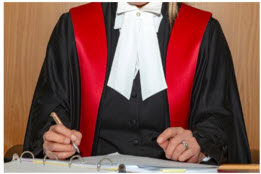Knowing what to call a judge or other judicial officer when speaking to them in court can be a challenge. This eNews explains how to address the judicial officers of the Provincial Court of British Columbia. It also explains why people involved in court proceedings should not send anything to a judge.
In court
In a courtroom, conference room, virtual proceeding, initial appearance room, judicial case manager’s office, or justice of the peace’s office:
• When you speak to a Provincial Court judge call them “Your Honour”. Judges generally preside in criminal, family, and small claims conferences and trials, wearing black robes with red bands for trials and a black jacket with white tabbed collar for conferences.

• When you speak to Provincial Court judicial justices call them "Your Worship". Judicial justices generally preside in traffic court and on trials of other ticketable offences, wearing black robes with green bands. They also conduct bail hearings and deal with applications for search warrants.
• When you speak to judicial case managers, justice of the peace adjudicators, and Court Services justices of the peace you generally call them "Your Worship”. Judicial case managers preside in initial appearance and assignment courtrooms in addition to scheduling trials and other matters in their offices. They and justices of the peace wear business clothes.

Find more information about the roles and responsibilities of these judicial officers on the Judges and Justices page of the Court’s website.
If you’re in doubt about what type of judicial officer is presiding in your matter and what to call them, you could ask a Duty Counsel lawyer or court staff.
Why are these traditional forms of address used in court?
Like judges’ robes, these ways of addressing judicial officers lend dignity to judicial proceedings, distinguish independent courts from other decision-making tribunals, and remind people of the important role our courts play in a democratic society - resolving disputes peacefully and fairly, and upholding our constitution and the rule of law.
Court Clerks and Sheriffs
In an effort to create a more inclusive environment for staff, the BC Court Services Branch has asked that you say “Deputy Sheriff” and “Court Clerk” when you speak to clerks and sheriffs.
Written correspondence
People involved in court proceedings (parties, witnesses, lawyers) should NOT send anything to a judge. It is never appropriate for parties to a proceeding to write privately to a judge. In fact, no one should send anything to a judge about a court proceeding they are conducting. The judge must decide each case based only on the admissible evidence and submissions presented in the courtroom.
If a party to a court case wants to submit documents, they must submit them to the Court Registry, following the Rules that apply to their case (for example, the Provincial Court Family Rules, Small Claims Rules) or directions given by a judge.
Documents filed in a court registry should not be addressed to a particular judge, unless the judge has directed otherwise.
Titles
Designations used by lawyers before being appointed a judge or judicial justice are superseded by their appointment. This includes Q.C., O.B.C., O.C., PhD, and any other official title. The only appropriate title for a judge to use after appointment is “The Honourable,” or “Judge”. Similarly, the only title to be used by a judicial justice while discharging their judicial duties is “Judicial Justice”.
After retirement
However, judges and judicial justices may resume using such titles with Ms., Mr., or Mx. and their surname after they retire from the bench.
The title “Honourable” is not used for retired Provincial Court Judges. Retired BC Provincial Court judges may be referred to and refer to themselves in correspondence as “Judge Lina Gill (retired)”.
Other courts
Different terms are used to address judges of other courts. For more information on forms of address, including for judges and other judicial officers of the Supreme Court of Canada, BC Court of Appeal, and BC Supreme Court, see:
• Provincial Court of BC Notice to the Profession and Public 02 “Form of Address for Judicial Justices”
• the Courthouse Libraries BC website
• the Government of Canada “Styles of Address” webpage
Updated May 2023

